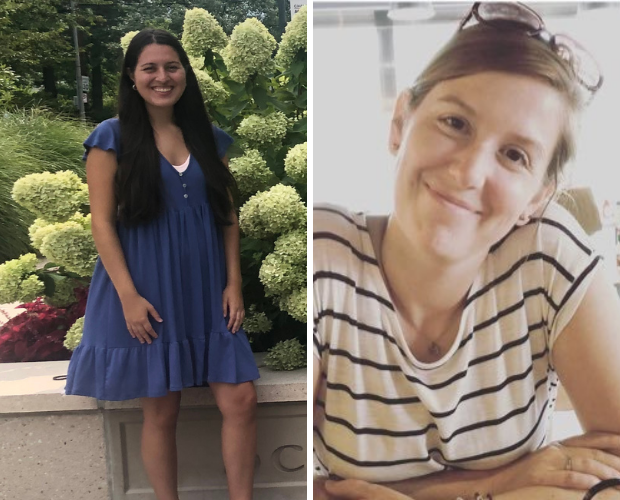SIS Alumna Mentors MA Student during Inclusion-Focused Internship
When Elena Hoffman, a current SIS graduate student in the Ethics, Peace, and Human Rights (EPHR) program, searched for fall internships this summer, she focused specifically on organizations that prioritized inclusion. She wanted to work somewhere that had a codified diversity statement and took actionable steps in this area.
Hoffman came across a listing for an inclusion internship at the International Foundation for Electoral Systems (IFES) and knew she had found a great fit. IFES is a nonprofit that works to advance democracy—collaborating with civil society, public institutions, and the private sector to build resilient democracies around the world. She was impressed with how the organization clearly laid out their position on diversity and inclusion and had a team dedicated to the inclusion of marginalized groups in civic participation.
After starting her internship this semester, Hoffman has been enriched by the work and principles of IFES, and she’s also gained a valuable mentor in her supervisor, Ashley Law, SIS/MA ’16. In recognition of National Boss’s Day on October 16, we spoke with both Hoffman and Law to learn more about their work at IFES and the benefits of their supervisory relationship.
A Mentorship Based on Shared Values and Experiences
Like Hoffman, Law was drawn to IFES because of the organization’s strong focus on inclusion. As an International Peace and Conflict Resolution (IPCR) alumna, she wanted to contribute to IFES’s work in conflict and peacebuilding, democracy, and elections as well as their initiatives to get young people involved in civics and politics.
Law has undertaken a variety of roles since joining IFES in 2017 and now serves as their first-ever youth specialist. She works across teams at the nonprofit to make sure their programs are tailored to the contexts and unique experiences of young people around the world.
“I find it so meaningful to be able to directly work with our young stakeholders,” says Law. “It’s not only an opportunity for us to share information with them and build up their capacity to participate in civic life, but it’s also an exchange in which I learn a lot from them as well. I love the fact that I get to develop true connections with the people I work with.”
Law has enjoyed involving Hoffman in these types of projects, especially because Hoffman’s focus in EPHR has a lot of overlap with her own degree from SIS. As an inclusion intern, Hoffman already has contributed edits to curricula and tools for youth engagement and participated in and summarized the contents of summits focusing on inclusion.
“By taking part in these summits and big meetings, I get to expand beyond even my job duties,” says Hoffman. “I recently got to attend the Disability Vote Summit, which focused on how individuals with disabilities participated in the 2020 election. I would have never been able to participate in and learn from such an event if it weren’t for the work I’m doing with IFES.”
The Impact of SIS
During this internship, Hoffman has been able to directly transfer what she’s learned so far in the EPHR program to her work: “I really appreciate that in my courses we are never looking at a question or a challenge in just one way. An important part of EPHR is looking at issues from multiple angles and asking the question of who are we forgetting in these conversations. This is similar to the types of questions we ask at IFES.”
Because Hoffman registered the internship for credit, she is simultaneously taking Professor Stephanie Fischer’s Internship in International Affairs course. The course helps students make the most out of their professional experiences and learn skills to better contribute to their workplaces. Every week, Hoffman focuses on a different professional theme—anything from goal-setting to analyzing emotional intelligence—and applies it to her internship. Fischer recently added a Diversity, Equity, and Inclusion (DEI) module to the course.
“It made sense to add DEI to the syllabus because it’s such an important aspect of peoples’ experiences at their jobs,” says Fischer. “This module helps students think critically about diversity, equity, and inclusion in the workplace—how organizations can do better in everything from how they onboard employees to social norms within the workplace.”
A Valuable Connection
Law has found Hoffman’s experience and interest in intersectionality very beneficial, as some of the nonprofit’s tools focus on young people with disabilities, young women, and, most recently, Indigenous youth. She emphasizes that Hoffman’s perspectives as well as her influence on IFES’s work are a boon.
As a manager, Law also aims to help Hoffman build up her leadership skills: “I think honing leadership skills earlier in your career will benefit you in the long run, especially in this field where you’ll have meetings with folks at high levels—whether that be the State Department or senior leadership within your organization. Having the confidence to engage in and contribute to those conversations and meetings is really beneficial and something that I hope Elena will take away from this.”
Meanwhile, Hoffman hasn’t just been able to grow professionally through her time working with Law, she’s also gained key insights that can be applied to her education at SIS. Because Law is an alumna, she’s given Hoffman advice about course schedules, applying for practica, and balancing school work with a part-time job.
“I think it’s so helpful that Ashley knows where I’m coming from. I’m very fortunate that we’ve gotten to work together, and wherever my future takes me, I hope we’re going to keep in contact,” says Hoffman. “She understands where I am in my life, and it’s such an invaluable relationship to have.”

